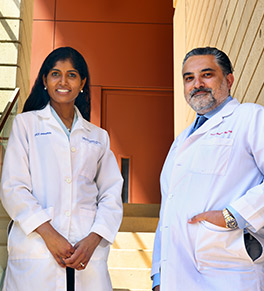A novel approach to advanced stomach cancer
STOPGAP clinical trial seeks better patient outcomes

Stomach cancer is the fourth leading cause of cancer deaths worldwide and one that usually isn’t detected until it is in advanced stages.
Once the cancer cells have spread into the abdominal cavity and lining, or peritoneum — a condition called gastric carcinomatosis — the survival rate is little more than six months. This is particularly concerning because the incidence of stomach cancer is on the rise in U.S. adults under 50, especially among Hispanics.
“We are seeing an alarming increase in these metastatic cancers, particularly gastric carcinomatosis in younger adults,” says UCI Health surgical oncologist Dr. Maheswari Senthil, a national expert in advanced abdominal cancers and director of the peritoneal malignancy program at the UCI Health Chao Family Comprehensive Cancer Center. “Patients need a fighting chance against this aggressive cancer.”
To improve options for these patients, Senthil has teamed up with UCI Health medical oncologist Dr. Farshid Dayyani, a leading expert in gastrointestinal malignancies and medical director of the cancer center’s Stern Center for Cancer Clinical Trials and Research.
Together, they have launched STOPGAP, an innovative phase 2 clinical trial that takes a three-pronged approach to treating gastric carcinomatosis.
Boosting chemotherapy’s effectiveness
The current standard of care for gastric carcinomatosis is intravenous (IV) chemotherapy. This regimen slows the cancer’s spread for about six months, then tumors usually start to grow again. Evidence suggests this systemic therapy alone is insufficient because the peritoneal membrane hinders the chemotherapy drugs’ ability to penetrate the abdominal cavity.
Infusing higher doses of chemotherapy directly into the abdominal area after systemic treatments may be more effective, says Senthil, a professor and John Wayne Cancer Foundation endowed chair in surgery at the UCI School of Medicine who also serves as medical director of the school’s Center for Clinical Research.
To be eligible for the STOPGAP trial, participants must have had at least three months of standard IV chemotherapy.
Next, trial participants have a port implanted into their abdominal fat tissue to deliver high doses of the chemotherapy drug paclitaxel directly into the peritoneum over a period of at least three months, a treatment called normothermic intraperitoneal chemotherapy (NIPEC). At the same time, the patient also receives a combination of paclitaxel and the chemotherapy drugs leucovorin and fluorouracil treatments intravenously.
Selected trial participants then undergo cytoreduction surgery to remove all visible signs of cancer from the abdominal cavity. The procedure has been shown to improve survival for patients with metastatic abdominal cancers.
The third step is to immediately bathe the surgical area with a heated chemotherapy solution for about 90 minutes to kill any remaining microscopic cancer cells, a procedure called hyperthermic intraperitoneal chemotherapy (HIPEC).
After surgery, most patients receive monthly immunotherapy infusions to further reduce the risk of cancer recurrence, Dayyani says.
Seeking better outcomes
STOPGAP is the only U.S. clinical trial to use all three treatment modes for advanced gastric and gastroesophageal adenocarcinomas. The goal is to demonstrate that this combination therapy is safe and improves patient survival rates. So far, seven patients are enrolled in the trial, which is actively recruiting up to 35 patients.
“Stage IV cancers like these can have very good outcomes with this type of care if you have the right team,” says Senthil, noting that UCI Health, home to the only National Cancer Institute-designated comprehensive center in Orange County, is one of the few health systems in Southern California with the necessary level of expertise in all three treatment modes.
STOPGAP is one of more than 300 active cancer clinical trials underway at UCI Health. It is supported in part by seed money from the UCI Anti-Cancer Challenge, the cancer center’s annual ride, run and walk event to raise awareness and funds for promising research. The community event, which has been held virtually the last two years, returns with in-person challenges on Oct. 8 at Aldrich Park on the UC Irvine campus.
Dayyani and Senthil are grateful for the funding that helped kick-start the STOPGAP study, which they hope will significantly increase long-term survival.
“The current standard of care for advanced gastric cancer is mainly palliative,” Senthil says. "We believe this approach will give these patients much better outcomes and longevity.”
Learn more about the STOPGAP trial ›
Related stories
Explore further
Browse more blog posts by topic.




